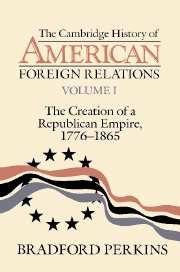Book contents
- Frontmatter
- 1 The Canvas and the Prism
- 2 The Birth of American Diplomacy
- 3 The Constitution
- 4 Federalist Diplomacy: Realism and Anglophilia
- 5 Jefferson and Madison: The Diplomacy of Fear and Hope
- 6 To the Monroe Doctrine
- 7 Manifest Destiny
- 8 Britain, Canada, and the United States
- 9 The Republican Empire
- Bibliographic Essay
- Index
- THE CAMBRIDGE HISTORY OF AMERICAN FOREIGN RELATIONS
- References
3 - The Constitution
Published online by Cambridge University Press: 28 March 2008
- Frontmatter
- 1 The Canvas and the Prism
- 2 The Birth of American Diplomacy
- 3 The Constitution
- 4 Federalist Diplomacy: Realism and Anglophilia
- 5 Jefferson and Madison: The Diplomacy of Fear and Hope
- 6 To the Monroe Doctrine
- 7 Manifest Destiny
- 8 Britain, Canada, and the United States
- 9 The Republican Empire
- Bibliographic Essay
- Index
- THE CAMBRIDGE HISTORY OF AMERICAN FOREIGN RELATIONS
- References
Summary
Peoples who emerge from colonialism usually find their triumph exhilarating, but almost all soon discover that independence is only the beginning of a process of nation building. Despite advantages – relative prosperity, experience in self-government – the Americans learned this lesson in the 1780s. Historians still debate the truth of the matter – was or was not the decade a time of economic growth? a period of political maturation? – but contemporaries had little doubt they were in a “critical period,” critical not only for their country but for the fate of republican government as well. John Quincy Adams, indeed, used the phrase in a commencement oration in 1787. Several years later, his father wrote, “I suspect that our posterity will view the history of our last few years with regret.” When the elder Adams wrote these words, he was vice-president under the new Constitution, an instrument of government produced both by the political philosophy undergirding the Revolution and by the frustrations of the 1780s.
The Articles of Confederation
The Continental Congress, legitimized only by the willingness of states to send delegates, had no power of coercion over them. Seeking to improve things. Congress proposed, and in 1781 the states approved. Articles of Confederation, but the remedy failed to create an effective national government. The approved text failed to capitalize “united states,” thus emphasizing the continued sovereignty of the parts. Almost all decisions, even in areas where Congress nominally had power, required the concurrence of nine of the thirteen states.
- Type
- Chapter
- Information
- The Cambridge History of American Foreign Relations , pp. 54 - 80Publisher: Cambridge University PressPrint publication year: 1993

